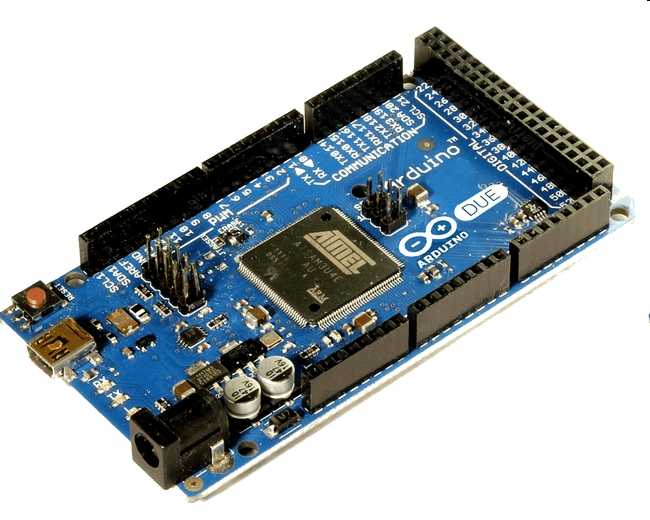| Arduino goes ARM - new modules |
| Written by Harry Fairhead | |||
| Monday, 19 September 2011 | |||
|
An ARM-based Arduino is the next step in the development of this open source platform, but it isn't all gain. The whole world seems to be going in ARMs direction. The latest version of Windows 8 will run on ARM processors and now the open source Arduino platform has a new member - the ARM-based Arduino Due announced at the Maker Faire in New York. The Due makes use of Amtel's SAM3U ARM-based process, which supports 32bit instructions and runs at 96Mhz. The Due will have 256KB of Flash, 50KB of SRAM, five SPI buses, two I2C interfaces, five serial ports, 16 12-bit analog inputs and more. This should be compared to the current best selling Arduino Uno with an 8-bit 16Mhz ATmega32, 32KB of Flash, 2KB of SRAM and a lot fewer I/O ports.
There are already some Arduino variants that use the PIC32 processor and are pin-compatible with other Arduino boards that are almost as powerful. There are also going to be some problems in moving to the new ARM processor. The first is that it uses 3.3V logic, which might cause problems interfacing with the standard Arduino 5V extension boards (shields). The second is that, while the Arduino is nearly always programmed in a high-level language which should be processor-independent, the availability of different I/O ports is going to cause some difficulties. From the Arduino blog: "Instead of just releasing the finished platform we are opening the process to the community early on. We’re going to be demoing the board and giving away some boards to a selected group of developers who will be invited to shape the platform while it’s been created. After Maker Faire, we will begin selling a small batch of Developer Edition boards on the Arduino store (store.arduino,cc) for members of the community who want to be join the development effort. We plan a final and tested release by the end of 2011." Of course the question is, How will this affect the soon-to-be-released, $25 Raspberry Pi, which is also based on ARM? The answer is, probably not much because Raspberry Pi runs Linux, and the Arduino doesn't, and Raspberry Pi doesn't have the I/O capabilities of the Arduino. As well as the ARM-based Due, a new low-cost and simpler version of the Uno, the Leonardo, was annouced. This is Uno-compatible and comes with a USB driver that can simulate a mouse, keyboard and serial port. The design of the Arduino 1 - the Arduino API, IDE and layout - has also been frozen. Also announced was the new Arduino WiFi Shield. This adds WiFi to any Arduino. There are fairly standard WiFi boards already available, but this one is open source and you should be able to modify it more easily. It is also possible to migrate old WiFi shield code to the new board. More InformationComic book guide to the Arduino .NET Gadgeteer - an alternative to Arduino?
To be informed about new articles on I Programmer, subscribe to the RSS feed, follow us on Twitter or Facebook or sign up for our weekly newsletter.
|
|||
| Last Updated ( Monday, 19 September 2011 ) |

